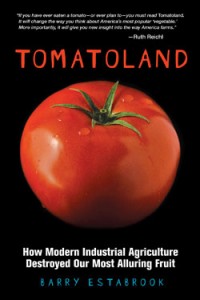 Something is not ripe with the tomato industry, according to Barry Estabrook’s book, Tomatoland: How Modern Industrial Agriculture Destroyed Our Most Alluring Fruit. Estabrook examines the corruption and hardships of the red and juicy fruit that is often seen atop many salads.
Something is not ripe with the tomato industry, according to Barry Estabrook’s book, Tomatoland: How Modern Industrial Agriculture Destroyed Our Most Alluring Fruit. Estabrook examines the corruption and hardships of the red and juicy fruit that is often seen atop many salads.
The fruit best known for being fresh in the summertime finds its way to the produce section each winter thanks to warm, sunny Florida weather. Estabrook writes that approximately one-third of the U.S.’s tomato supply comes from a state where tomatoes do not naturally grow. Florida’s environment is often difficult with a lack of nitrogen in the soil, insect pests, and bacterial and fungal diseases that can threaten the life of a plant. To make up for these disadvantages, tomato growers often spray the tomato farms with chemicals and pesticides, according to Estabrook.
These chemicals are very harmful to the hard-working tomato pickers and their families, who can get sick or have children with several birth defects. Not to mention these chemicals are extremely harmful to consumers, who may be at risk when ingesting the tomatoes. In addition, tomato pickers work very long and taxing hours in the brutal sun. The workers get no paid vacation and no benefits, and some have even been forced into slavery.
Jane Black writes for the Washington Post, “But there is still much work to be done. By the end of Tomatoland, a far more obvious solution will present itself to some readers: Head to the backyard and plant a few tomatoes of your own.”
The state of the industry is in the consumer’s hands, Estabrook suggests. The consumer must demand a better, healthier product.
Dwight Garner for the New York Times writes, “It’s infuriating to read of their lack of regard for the taste of their product. Historically, when a farmer has learned to grow a taste variety, that farmer has actually been scorned and prevented from shipping it.”
Estabrook’s Tomatoland investigates this particular sect of the agriculture industry and suggests that consumers demand more quality out of their produce. All of the adjustments to the land and harmful chemicals poured over the tomato plants turn a seemingly healthy part of a diet into something processed and harmful for human consumption.
